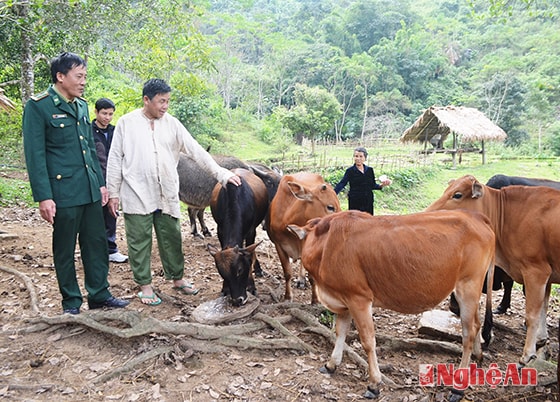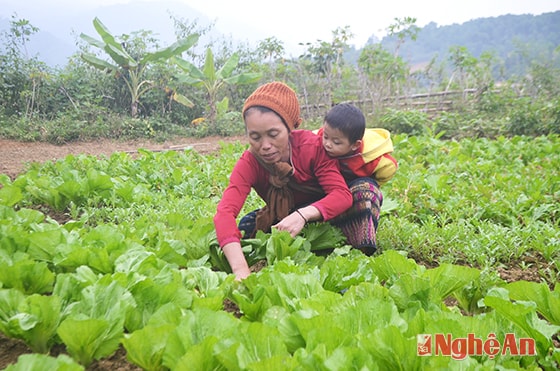Stories of people asking to leave poverty
(Baonghean) - In the two recent poor household reviews, many households in the mountainous commune of Tri Le, Que Phong district voluntarily applied to be removed from the poor household list, even though they knew they would lose state subsidies. These are positive signs in the local poverty reduction effort. It also shows that many people no longer "wait and rely" but are rising up strongly and taking control of their lives...
(Baonghean) - In the two recent poor household reviews, many households in the mountainous commune of Tri Le, Que Phong district voluntarily applied to be removed from the poor household list, even though they knew they would lose state subsidies. These are positive signs in the local poverty reduction effort. It also shows that many people no longer "wait and rely" but are rising up strongly and taking control of their lives...
I have had many opportunities to visit the borderland of Tri Le. And every time, this land brings me new things and interesting surprises. This time, Tri Le has just finished reviewing the list of poor households in 2015. In addition to the encouraging figures about the poverty rate continuing to decrease, the story that is told most by the cadres and people of Tri Le commune is that in Chieng village, there are still people who voluntarily ask to leave the poor household.
 |
| Party member Luong Van Sinh (right) voluntarily withdrew from the poor household list. |
Ban Chieng has 74 households with hundreds of people. In the highland border area, the climate is harsh, life isThe people still face many difficulties. Hundreds of mouths to feed all year round depend on the 13 hectares of rice production, of which 11 hectares can produce 2 crops, then the cassava and corn growing areas and livestock and poultry raising areas. Therefore, the village still has 49 poor households. In the 2014 poor household review, the whole village had 7 party members who voluntarily asked to leave the poor household list and in the 2015 poor household review, the whole village continued to have 3 party members: Ha Thi Kim, Ha Van Tien, Ha Van Thong who voluntarily asked to leave the poor household list. Talking to us, comrade Lo Van Huyen - Secretary of the Chieng village Party cell excitedly said: "In each meeting, the Party cell has deployed the content of the campaign to raise the awareness and responsibility of party members in hunger eradication and poverty reduction. Therefore, many party members have focused on developing the family economy effectively, setting an example of themselves leaving the poor household list for the people to look up to and learn from".
 |
| Ms. Lo Thi Duyen is one of the party members who asked to withdraw from the poor household list. |
A typical example is the family of party member Luong Van Sinh. Following the guidance of the Chieng Village Management Board, I visited his family's farm, nestled in a narrow valley of the Pha Cang mountain range. Born in 1952, he used to join the frontline labor force, then returned to his hometown to work as a commune cadre for a long time and then retired to receive a one-time allowance. However, the family has 5 children, and has to support their elderly parents and an aunt, so life is always lacking. In that situation, he invested in reclaiming land and developing production. Now, on the terraced fields of over 1 hectare irrigated by Nam Hong waterfall, only one crop can be grown each year due to harsh climatic conditions, but thanks to diligent care, the family also harvests 4 tons of rice, enough for food and livestock. In addition, he also raises 4 buffaloes, more than 10 cows, pigs, chickens and has a 1,000 m2 pond to raise grass carp, tilapia... After many months of hardship, his family's life has gradually stabilized. Mrs. Lo Thi Binh - Mr. Luong Van Sinh's wife sincerely confided: "My daughter has a heart disease and still doesn't have money for surgery, so my husband and I are now raising 2 more children for her. It's still very difficult, but my husband and I still want to be out of the poor household list in 2014". Mr. Sinh sat next to him and expressed: "We are not rich yet, but in the village there are still many people in worse circumstances than us. My husband and I discussed and agreed that as party members, we must be exemplary in production and raising livestock to escape poverty so that the villagers can learn from us...".
Saying goodbye to Mr. Sinh's family, I visited the family of Ms. Lo Thi Duyen, one of the party members who proactively applied to leave the poor household status in 2014. On an area of 4 hectares of reclaimed land, her family grows 3 hectares of rice in 2 crops, each year also harvesting 5 - 6 tons of rice. In addition, she also raises 3 cows, 2 buffaloes and has about 150m2 of fish pond, at the same time, she sets aside a small area of land to grow vegetables. Ms. Luong Thi Duyen said: "Rice is enough for living and raising animals. During the vegetable harvest season, I also pick vegetables every day to sell at the commune market, earning an average of 50,000 VND. Life is therefore much more stable than before". What is admirable is that she has proactively and enthusiastically mobilized and guided many households in the village on how to produce and grow vegetables to improve their lives and increase their income. For example, the households of Mr. Vi Van Tuong and Ms. Lo Thi Chuyen. Thanks to Ms. Duyen's encouragement, Mr. Tuong and his wife did not accept poverty and focused on reclaiming more land for farming, raising livestock, and developing production. In addition to growing rice, the family also raised 3 cows, fish, chickens, and ducks. To increase income, after being guided by Ms. Duyen, the family also grew vegetables for their own use and for sale. During the harvest season, they earned an average of 60,000 - 100,000 VND per day. Since then, Mr. Tuong and his wife volunteered to be removed from the list of poor households in 2014.
Not only in Chieng village, but also in many other villages of Tri Le commune, there are many households voluntarily asking to "escape poverty". According to Mr. Lo Xuan Thu - Chairman of Tri Le commune People's Committee, in the 2014 poor household review, there were more than 20 cases, mainly village chiefs and party cell secretaries asking to leave poor households and in 2015 there were many other cases. "Not all households that voluntarily ask to leave poor households have a well-off life. But in general, these households try to develop their economy so their life is much better than other poor households. That is a good thing because they no longer have the mentality of waiting and relying on others. Even, like the case of party member Lu Van Thuong in Lam village who insisted on leaving poor households because he had been poor for too long and felt ashamed in front of the people", said Mr. Thu.
Thus, it can be seen that the thinking of the people, especially the party members in the villages, has changed positively, thereby contributing to the work of hunger eradication and poverty reduction in the Tri Le highlands to achieve important results. According to statistics, the poverty rate of the commune decreased from 73.8% in 2011 to 55.7% in 2014. The average income per capita increased from 5.5 million VND/person in 2010 to 9.4 million VND/person in 2014. Those telling numbers are clear evidence of the solutions to increase people's income that have been implemented by the party committees and authorities at all levels in the area, such as the model of growing passion fruit, Japonica cold-resistant rice, growing Mong peaches, raising fish in cages... However, compared to the general level of Que Phong district and the whole province, the poverty rate of Tri Le commune is still high. Therefore, it is hoped that the pioneering of families voluntarily leaving poverty will spread more and more widely in the community. This means that more and more people will rise up to escape poverty strongly, not content with their status quo. Only then will policies to support production development implemented in the locality be better absorbed, and accordingly, the poverty reduction effort in remote mountainous areas will become more sustainable.
Article and photos:Nhat Le






